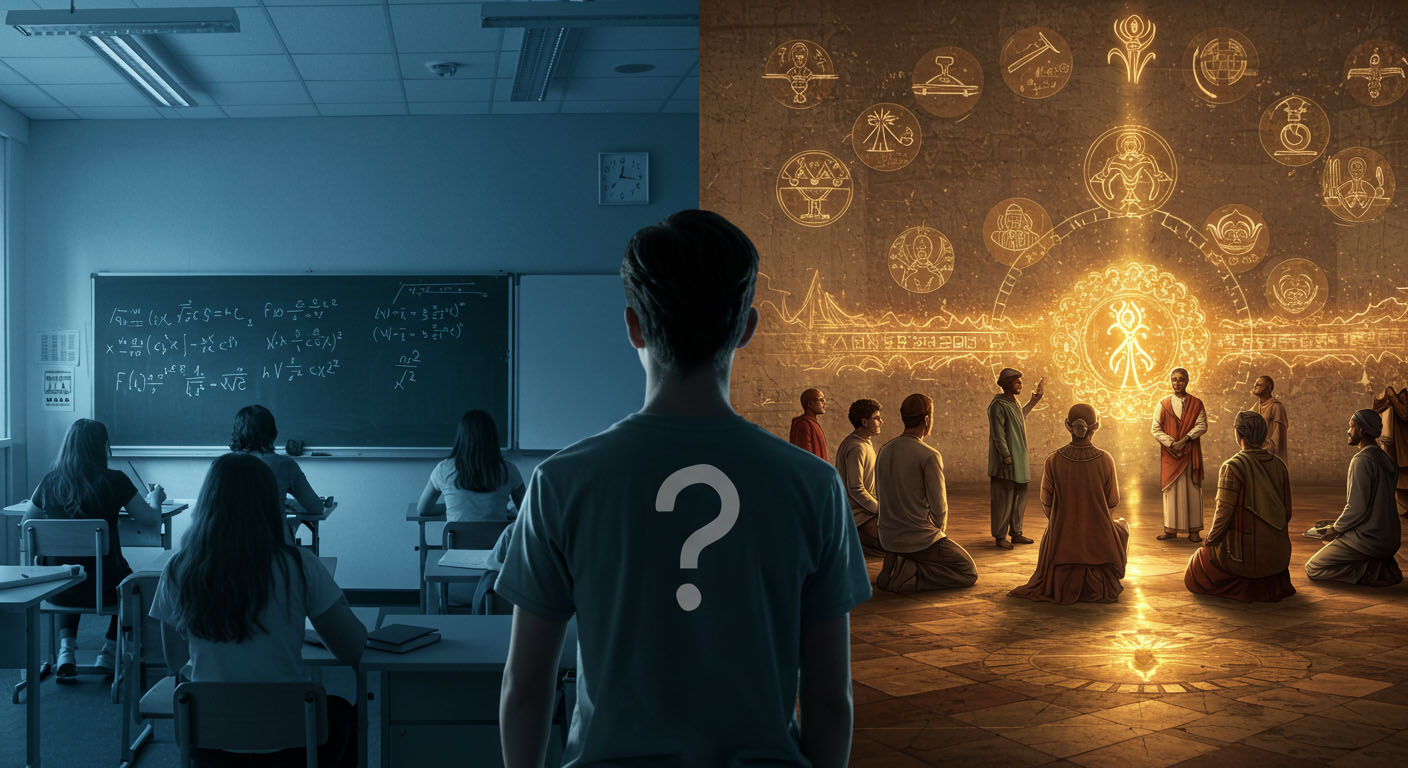Why We Teach Calculus But Not How to Read Human Nature (The Greatest Educational Blind Spot)

Why We Teach Calculus But Not How to Read Human Nature (The Greatest Educational Blind Spot)
Here's a paradox that should shock every parent and educator: We live in the most technically advanced civilization in history, yet people continue making the same emotional and relationship mistakes humans have been making for thousands of years.
Your teenager can solve complex equations but can't recognize manipulation. They understand molecular biology but fall for the same toxic relationship patterns that destroyed their great-grandparents' happiness. They can code algorithms but can't read body language or understand their own emotional reactions.
Why do we teach students to master the physical world while leaving them completely illiterate about human nature?
The Great Knowledge Transfer Success Story
Mankind has always been brilliantly skillful at gathering and transferring technical knowledge. Every innovation builds on countless past breakthroughs. This accumulated wisdom saves each new generation from unnecessary reinvention, from retreading redundant paths.
The Technical Knowledge Success:
- Mathematics: Students learn 3,000+ years of mathematical discoveries in 12 years
- Science: Centuries of scientific breakthroughs compressed into digestible curricula
- Technology: Each generation builds on previous innovations rather than starting from scratch
- Engineering: Complex knowledge systems passed down efficiently through structured education
Result: An 18-year-old today knows more about physics than Newton, more about chemistry than ancient alchemists, more about biology than medieval scholars.
But here's the tragedy: That same 18-year-old will stumble through the same relationship disasters, emotional patterns, and life mistakes that have been documented and understood for millennia.
The Emotional Intelligence Waste
Despite abundant resources—books, poetry, music, philosophy—much wisdom about human emotions and relationships is completely wasted. The same person who wouldn't dream of spending years reinventing a physical law will inadvertently stumble repeatedly over age-old life mistakes.
What We Don't Teach:
- Body language: Reading the 55% of communication that's non-verbal
- Psychology: Understanding how the mind actually works and makes decisions
- Logic and reasoning: Identifying logical fallacies and manipulative arguments
- Gender differences: Understanding how different people process emotions and communicate
- Memory functioning: How memory actually works vs. how we think it works
- Instinctual behaviors: Recognizing unconscious drives and automatic reactions
- Relationship dynamics: The patterns that create lasting vs. destructive relationships
The Cost of This Ignorance:
- Relationship failures: 50%+ divorce rates despite thousands of years of relationship wisdom
- Emotional suffering: Depression and anxiety epidemics in the most prosperous societies in history
- Manipulation vulnerability: People falling for the same scams, political manipulation, and social pressures
- Life decade waste: Adults spending 20-30 years learning lessons that could be taught to teenagers
The Educational Absurdity
We prioritize knowledge that most people will never use professionally while ignoring knowledge that everyone will use daily:
What Schools Obsess Over:
- Advanced calculus: Used by less than 5% of population in their careers
- Detailed historical dates: Memorizing information easily looked up
- Complex chemistry: Relevant to tiny percentage of students' future work
- Literary analysis: Skills used primarily by literature professors
What Schools Completely Ignore:
- Reading people: Skills used in every human interaction for entire lifetime
- Emotional regulation: Managing stress, anger, and emotional reactions
- Relationship building: Creating and maintaining healthy personal and professional relationships
- Decision-making: How to make good choices under uncertainty and emotional pressure
- Conflict resolution: Handling disagreements without destroying relationships
- Self-awareness: Understanding your own motivations, triggers, and patterns
The Insanity: We prepare students for academic tests while leaving them completely unprepared for life's actual challenges.
The "Enlightenment" Myth Exposed
When I hear glowing tales about "enlightened" individuals, it often elicits a melancholic smile.
The truth about "enlightened" people: They're just ordinary individuals who spent years after secondary and higher education studying the aspects intentionally bypassed in schools.
What makes someone seem "wise":
- Emotional intelligence: Understanding how emotions work and how to manage them
- Relationship skills: Knowing how to build trust, communicate effectively, and resolve conflicts
- Psychology knowledge: Understanding human motivation, cognitive biases, and behavior patterns
- Philosophical framework: Having coherent principles for making life decisions
- Self-awareness: Understanding their own strengths, weaknesses, and unconscious patterns
The shocking reality: Anyone with decent intellect and capacity to learn could become "enlightened" by age 18 if schools actually taught human wisdom alongside technical knowledge.
The Ancient Wisdom That's Already Available
This isn't about inventing new knowledge—the wisdom about human nature and relationships has been discovered, tested, and documented for thousands of years:
Relationship Wisdom:
- Ancient Greek philosophy: Understanding virtue, character, and human motivation
- Buddhist psychology: 2,500+ years of insights into suffering, attachment, and emotional regulation
- Stoic philosophy: Practical frameworks for handling adversity and maintaining emotional balance
- Indigenous wisdom: Traditional knowledge about community building and conflict resolution
Emotional Intelligence Knowledge:
- Classical literature: Centuries of human psychology explored through stories and character studies
- Traditional psychology: Understanding personality types, emotional patterns, and behavioral dynamics
- Cultural wisdom: Practices from every culture for building emotional resilience and social skills
- Contemplative traditions: Meditation and mindfulness practices for self-awareness and emotional regulation
Social Understanding:
- Anthropological insights: How human societies function and what creates cooperation vs. conflict
- Historical patterns: Understanding how power, manipulation, and social influence work
- Communication studies: Decades of research on effective communication and persuasion
- Game theory: Understanding cooperation, competition, and strategic thinking
This knowledge exists. It works. It's been tested across cultures and centuries. We just don't teach it to young people when they need it most.
How MarpoleAI Fills the Wisdom Gap
This is where MarpoleAI's collective intelligence becomes revolutionary—not by creating new wisdom, but by organizing and democratizing the emotional and social knowledge that already exists.
The Wisdom Coordination Challenge:
Traditional Problem: Human wisdom scattered across thousands of books, cultures, and traditions with no systematic way to learn it efficiently
MarpoleAI Solution: Collective intelligence that organizes emotional and social wisdom into structured, age-appropriate learning experiences
Comprehensive Human Knowledge Integration:
Emotional Intelligence Curriculum:
- Self-awareness: Understanding your own emotional patterns, triggers, and unconscious behaviors
- Social awareness: Reading body language, recognizing emotional states in others, understanding group dynamics
- Relationship skills: Building trust, communicating effectively, resolving conflicts constructively
- Decision-making: Making good choices under emotional pressure and uncertainty
Traditional Wisdom Access:
- Ancient philosophy: Practical frameworks from Stoicism, Buddhism, and other wisdom traditions
- Cultural knowledge: Relationship and social wisdom from diverse cultures and communities
- Contemporary psychology: Modern insights about human behavior integrated with traditional understanding
- Practical ethics: Real-world guidance for making ethical decisions in complex situations
Life Skills Education:
- Communication mastery: Understanding how different people process information and make decisions
- Influence awareness: Recognizing manipulation, persuasion techniques, and social pressure
- Community building: Creating and maintaining healthy personal and professional relationships
- Conflict transformation: Turning disagreements into opportunities for deeper understanding
Fair Compensation for Wisdom Holders:
Knowledge Contributors Receive Tokens For:
- Traditional teachers: Elders and wisdom keepers sharing traditional knowledge about human nature
- Relationship experts: Therapists and counselors contributing practical relationship skills
- Philosophers and ethicists: Thinkers who help organize moral and ethical frameworks
- Cultural wisdom holders: People preserving and sharing cultural knowledge about community and cooperation
Structured Learning Without Life's Painful Trials:
Instead of learning through decades of mistakes:
- Pattern recognition: Understanding common relationship and life patterns before falling into them
- Emotional preparation: Developing emotional tools before facing major life challenges
- Wisdom integration: Learning from others' experiences without having to repeat them
- Cultural learning: Accessing wisdom from multiple cultures and traditions simultaneously
The Two-Track Educational Disaster
In technology: Universal education, steady progress, forward momentum
In human wisdom: Little to no education, chaos, systemless circular motion of suffering
The Result:
- Technical mastery: Humans who can manipulate the physical world with extraordinary precision
- Emotional illiteracy: The same humans repeatedly failing at relationships, emotional regulation, and life satisfaction
- Cognitive dissonance: Advanced societies with primitive approaches to human happiness and social cooperation
- Generational repetition: Each generation making the same emotional and social mistakes as their parents
What Early Emotional Education Could Prevent
If we taught emotional intelligence from childhood:
Relationship Success:
- Pattern recognition: Understanding healthy vs. toxic relationship dynamics before entering them
- Communication skills: Learning to express needs and resolve conflicts constructively
- Emotional regulation: Managing emotions without damaging relationships
- Attachment understanding: Recognizing and healing attachment patterns that create relationship problems
Personal Development:
- Self-awareness: Understanding personal strengths, weaknesses, and unconscious patterns
- Emotional intelligence: Managing emotions effectively under stress and pressure
- Decision-making: Making choices aligned with long-term values rather than short-term impulses
- Resilience building: Developing ability to handle adversity without being overwhelmed
Social Competence:
- Influence awareness: Recognizing manipulation, peer pressure, and social conditioning
- Community building: Creating positive relationships and contributing to group wellbeing
- Cultural intelligence: Understanding and appreciating different perspectives and values
- Ethical reasoning: Making moral decisions in complex real-world situations
The Time Savings: Learning these skills at 15 instead of 35 saves 20 years of unnecessary suffering and relationship failures.
The Collective Wisdom Revolution
The Knowledge Exists—We Just Need Better Coordination
MarpoleAI represents the possibility of finally organizing humanity's emotional and social wisdom into systematic education that serves young people when they need it most.
Not New Wisdom—Better Access:
- Ancient insights: Wisdom traditions from every culture made accessible and practical
- Contemporary research: Modern psychology and social science integrated with traditional knowledge
- Cultural diversity: Relationship and social wisdom from diverse communities and perspectives
- Practical application: Real-world guidance for handling actual life situations
Compensation for Wisdom Keepers:
- Traditional teachers: Fair payment for elders sharing cultural wisdom about human nature
- Contemporary experts: Therapists, counselors, and social workers contributing practical skills
- Philosophers and ethicists: Thinkers helping organize moral frameworks for complex decisions
- Community builders: People with experience creating healthy relationships and communities
The Choice: Continue the Cycle or Break It
Every generation faces the same choice:
Continue the Emotional Illiteracy Cycle:
- Send young people into the world with technical knowledge but no understanding of human nature
- Let them learn relationship and emotional skills through decades of painful trial and error
- Accept that most people will repeat the same life mistakes as previous generations
- Maintain separation between technical education and wisdom about living well
Build Systematic Emotional Education:
- Integrate human wisdom with technical knowledge in comprehensive education
- Teach emotional intelligence and relationship skills as systematically as we teach mathematics
- Give young people access to thousands of years of wisdom about human nature and social cooperation
- Create learning systems that help each generation build on previous emotional and social understanding
The question isn't whether this wisdom exists—it does. The question is whether we'll organize it into systematic education that serves human flourishing.
MarpoleAI represents the collective intelligence infrastructure that could finally make comprehensive human wisdom education possible at scale.
Where Mind Mirrors Money™—Where Ancient Wisdom Creates Modern Solutions
Ready to explore why technical education advanced while emotional wisdom stagnated? The answer reveals how we can finally bridge this gap.


